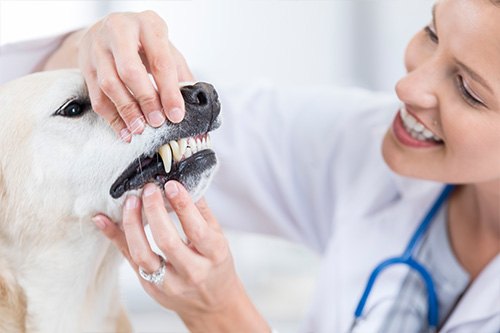Imagine what your mouth would feel like if you never brushed your teeth or went to the dentist. For many dogs and cats, this is a painful reality. According to the American Veterinary Dental Society, more than 80% of dogs and 70% of cats have dental disease by the age of 3. The dental (or periodontal) disease is the most frequently diagnosed health problem in pets.
Common signs of dental disease include:
- Yellow or brown buildup (tartar) on the teeth
- Red, swollen, or bleeding gums
- Bad breath
- Excessive drooling
- Changes in eating or chewing habits
- Pawing at the face
- Loose teeth
- Depression
Even if your dog or cat doesn’t have these symptoms, we recommend that you have a veterinarian evaluate your pet’s dental health at least once a year. Bacteria and food debris accumulate around the teeth and, if left unchecked, will lead to the deterioration of the soft tissue and bone surrounding the teeth. This decay can result in irreversible periodontal disease, tooth loss, and possibly expensive oral surgery.
Dental disease can also affect other organs in the body: Bacteria in the mouth can get into the bloodstream and cause serious infections in the kidneys, liver, lungs, and heart. If these problems aren’t caught and treated quickly enough, they can result in death. A physical exam combined with appropriate laboratory work can determine if the infection in the mouth has spread.
Schedule your pet’s dental exam today! We can also show you how to brush your pet’s teeth and recommend foods and treats that will help combat plaque and tartar buildup.
Imagine cómo se sentiría su boca si nunca se cepillara los dientes ni fuera al dentista. Para muchos perros y gatos, esta es una realidad dolorosa. Según la American Veterinary Dental Society, más del 80 % de los perros y el 70 % de los gatos tienen enfermedad dental a los 3 años de edad. La enfermedad periodontal es el problema de salud más frecuentemente diagnosticado en mascotas.
Síntomas comunes de la enfermedad dental:
- Acumulación amarilla o marrón (sarro) en los dientes.
- Encías rojas, inflamadas o con sangrado.
- Mal aliento.
- Babeo excesivo.
- Cambios en los hábitos de alimentación o masticación.
- Rascarse la cara o el hocico con las patas.
- Dientes flojos o pérdida de dientes.
- Decaimiento o depresión.
Incluso si su perro o gato no presenta síntomas, recomendamos que un veterinario evalúe su salud dental al menos una vez al año. Las bacterias y los restos de comida se acumulan alrededor de los dientes y, si no se controlan, provocan el deterioro del tejido blando y del hueso que sostiene los dientes. Esto puede llevar a una enfermedad periodontal irreversible, pérdida de dientes y costosas cirugías orales.
La salud dental afecta a todo el organismo
Las bacterias en la boca pueden ingresar al torrente sanguíneo y causar infecciones graves en órganos como los riñones, el hígado, los pulmones y el corazón. Si estos problemas no se detectan y tratan a tiempo, pueden ser mortales. Un examen físico combinado con pruebas de laboratorio puede determinar si la infección se ha propagado.
¡Programe el examen dental de su mascota hoy mismo! También podemos enseñarle cómo cepillarle los dientes y recomendarle alimentos y premios dentales para ayudar a reducir la acumulación de placa y sarro.


